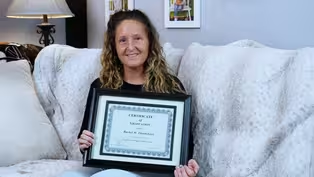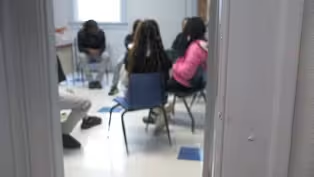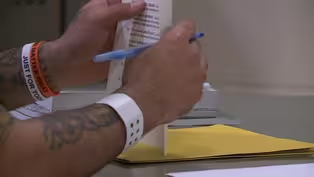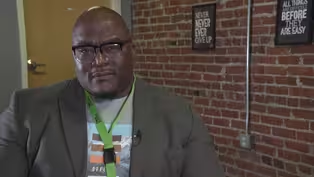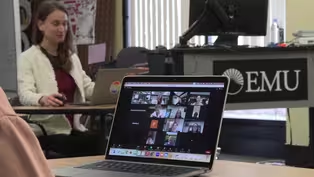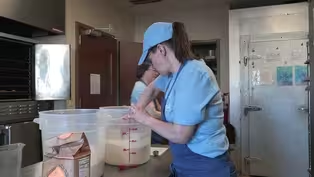VPM News Focal Point
Restorative justice’s Indigenous roots
Clip: Season 3 Episode 8 | 7m 47sVideo has Closed Captions
Howard Zehr on his role in restorative justice movements and the philosophies’ indigenous roots.
Howard Zehr, often called the “grandfather” of restorative justice, speaks about his role in the movement and how it is shaped by indigenous traditions and cultures.
Problems playing video? | Closed Captioning Feedback
Problems playing video? | Closed Captioning Feedback
VPM News Focal Point is a local public television program presented by VPM
VPM News Focal Point
Restorative justice’s Indigenous roots
Clip: Season 3 Episode 8 | 7m 47sVideo has Closed Captions
Howard Zehr, often called the “grandfather” of restorative justice, speaks about his role in the movement and how it is shaped by indigenous traditions and cultures.
Problems playing video? | Closed Captioning Feedback
How to Watch VPM News Focal Point
VPM News Focal Point is available to stream on pbs.org and the free PBS App, available on iPhone, Apple TV, Android TV, Android smartphones, Amazon Fire TV, Amazon Fire Tablet, Roku, Samsung Smart TV, and Vizio.
Providing Support for PBS.org
Learn Moreabout PBS online sponsorshipANGIE MILES: Howard Zehr has been developing and promoting restorative justice principles since the seventies.
He's the founder of the Zehr Institute for Restorative Justice at Eastern Mennonite University, where he is still teaching today.
Thank you so much for joining us.
HOWARD ZEHR: Thank you.
Thank you for having me.
ANGIE MILES: So, what is the short story of how you became known as the grandfather of restorative justice?
HOWARD ZEHR: Well, in the 1970s, I reluctantly got involved with this new idea that some people were doing on bringing victims and offenders together in criminal cases.
I was very reluctant, because I came from a background of defense in working with prisoners and defendants.
But, when I sat down and began to listen to victims and hear their stories and hear their needs, and then when I began to see what happened when victims and offenders came together, it just shook up my whole world.
And I began to realize, we've been thinking about this wrong.
And so I began to look at what the community mediation field was saying, what victim's rights field was saying, what we were learning from the civil rights movement, things like that.
And I began to synthesize what I was reading and hearing and experiencing into a concept.
And I found this term restorative justice and applied that in the late seventies or early eighties, and then it kind of went from there.
ANGIE MILES: So if you talk with people today, if they're taking more of a restorative justice approach, you will hear a lot of discussion about what the perpetrators need to be whole, to be healed, to be well.
And it can seem in some ways that we are not focused on the victims at all.
But you would say that this really is a victim-centered approach.
How so?
HOWARD ZEHR: Our system is so defendant, so oriented around the defendant and the offenders, and that so many of the people involved in it come from that background, that it's very easy for the victim's side to get left out.
But really, what restorative justice is about is addressing the harms and the needs that have happened, and finding out whose obligations they are to repair those harms.
And so the victims have got to be central in this thing.
So I've spent a lot of my career trying to help remind people that this is about everybody.
It's about victims, it's about offenders, it's about engaging the community in this process.
ANGIE MILES: As you became more experienced in developing your restorative justice approach and expanding your teaching, you discovered that this is kind of an archetype actually, among Indigenous people, maybe among Mennonites.
You mentioned the civil rights movement.
There is something in peace-loving cultures that leans towards restorative justice.
Could you elaborate that?
HOWARD ZEHR: I've had so many graduate students from Indigenous traditions around the world.
I've traveled around the world.
And I've realized that most traditions, most Indigenous traditions, have both a restorative and a retributive element in it.
But there are strong restorative Indigenous traditions that I didn't know about originally.
And what I found is that, well, I had a judge in New Zealand, for instance, tell me a Maori judge, that really what I was doing is articulating things in a way that Europeans could understand that were being written off as Maori.
In other words, I was helping people to understand what were really Indigenous in a lot of ways, but in a modern context.
So yeah, I think restorative justice has a lot of resonance with many Indigenous traditions.
ANGIE MILES: But you also grew up in a Mennonite tradition.
HOWARD ZEHR: Yes.
ANGIE MILES: Where's the overlap there?
How did that inform what you went on to do?
HOWARD ZEHR: Well, I've always said that my writing and my thinking on this is a synthetic one.
I didn't invent ideas.
I was pulling things together.
And in my case, when I wrote the book Changing Lenses, which came out in 1990, was seen as kind of a foundational piece, I was pulling together my religious tradition, I was pulling together my religious tradition, which was Mennonite, except that so much of western civilization has been shaped by Christian theology.
I think even if one isn't a Christian, you need to understand where this came from.
We're going to fix it.
So I was doing that.
I was basing it on experiences that we were having in this field of bringing victims and offenders together.
And my training is as a European historian, so I was going back to my Indigenous tradition as a European American, and finding this restorative, or what I call community justice element, in that.
So it was really integrating my own background experiences and learnings into it, and then later finding out that this really connected with Indigenous processes as well.
ANGIE MILES: Okay, and not just in criminal justice, but in everyday life, even in families when parents are trying to mediate between feuding children in the backseat or wherever, how can we each do more to focus on repair and healing more so than on punishment or banishment, for example?
HOWARD ZEHR: Well, it's partly by helping people take responsibility for their actions.
That's a lot of what restorative justice is about.
It's about treating everybody equal.
It's about engaging people in the process.
Getting people to talk together about it.
Looking for solutions instead of punishing as much as possible.
Those kind of principles are pretty universal.
ANGIE MILES: So, again, to take it down to the example level, if Johnny hit Susie, and you know, the parent steps in and says, "Johnny, you apologize to her right away", is that restorative justice, or does something more nuance have to happen?
HOWARD ZEHR: Yeah, it has to be more nuanced than that.
I have a friend that was a practitioner for many years.
She's one of the best practitioners I know.
And her kids used to say, whenever they do something, they'd say, "Oh, no, now we're going to have to sit down and talk about it."
But that was, you talked about it.
You tried to help teach it.
Help them to understand the harm that the other had experienced.
You helped, chance who, the person who's experienced the harm to be able to articulate it and see what their needs are.
So it's a question of dialogue around these and helping people to take responsibility.
A forced apology just doesn't really...
But quickly, what would you say is the future of restorative justice?
Do you think it will continue to spread?
How does criminal justice look in the future?
HOWARD ZEHR: You know, I think that it is been some real impact in the criminal justice arena, but I'm not very optimistic of huge change.
I mean, we have so many, it is so entrenched in this country.
It has got so many interests that it serves.
But it's been a leavening kind of thing.
It's inspired people.
It's led to some really good outcomes for people.
But the most exciting applications are things like schools, I think, or even the Smithsonian Museum of American History has a center for restorative history that's trying to address the wrongs done by museums.
That's exciting to me.
Those are the kind of applications where I think we're really going to have an impact.
ANGIE MILES: We're growing, we are evolving, hopefully we're getting things right.
And those who are practitioners will say that they owe a lot to you, the grandfather of the restorative justice movement, Howard Zehr, who comes to us from Eastern Mennonite University and the Zehr Institute.
And thank you so much for taking the time to talk with us about restorative justice.
HOWARD ZEHR: Thank you.
Diversion courts are rooted in restorative justice
Video has Closed Captions
Clip: S3 Ep8 | 3m 24s | Special dockets offer support for veterans and others to avoid jail time. (3m 24s)
Lynchburg City Schools work to curb suspensions using restorative practices
Video has Closed Captions
Clip: S3 Ep8 | 3m 48s | School districts throughout the nation are shifting towards restorative justice. (3m 48s)
Reincarceration in the Commonwealth
Video has Closed Captions
Clip: S3 Ep8 | 3m 53s | A local jail is combating recidivism with a program that aims to rehabilitate inmates. (3m 53s)
Restorative justice in Virginia
Video has Closed Captions
Clip: S3 Ep8 | 7m 32s | How agencies find alternatives to punishment in the Commonwealth. (7m 32s)
Restorative justice’s ties to Mennonite faith
Video has Closed Captions
Clip: S3 Ep8 | 3m 48s | Big criminal justice reform ideas are from a small campus in Virginia’s Blue Ridge Mountains. (3m 48s)
Video has Closed Captions
Clip: S3 Ep8 | 3m 38s | A Roanoke restorative program kneads change through breadmaking. (3m 38s)
Providing Support for PBS.org
Learn Moreabout PBS online sponsorship
- News and Public Affairs

Top journalists deliver compelling original analysis of the hour's headlines.

- News and Public Affairs

FRONTLINE is investigative journalism that questions, explains and changes our world.












Support for PBS provided by:
VPM News Focal Point is a local public television program presented by VPM
